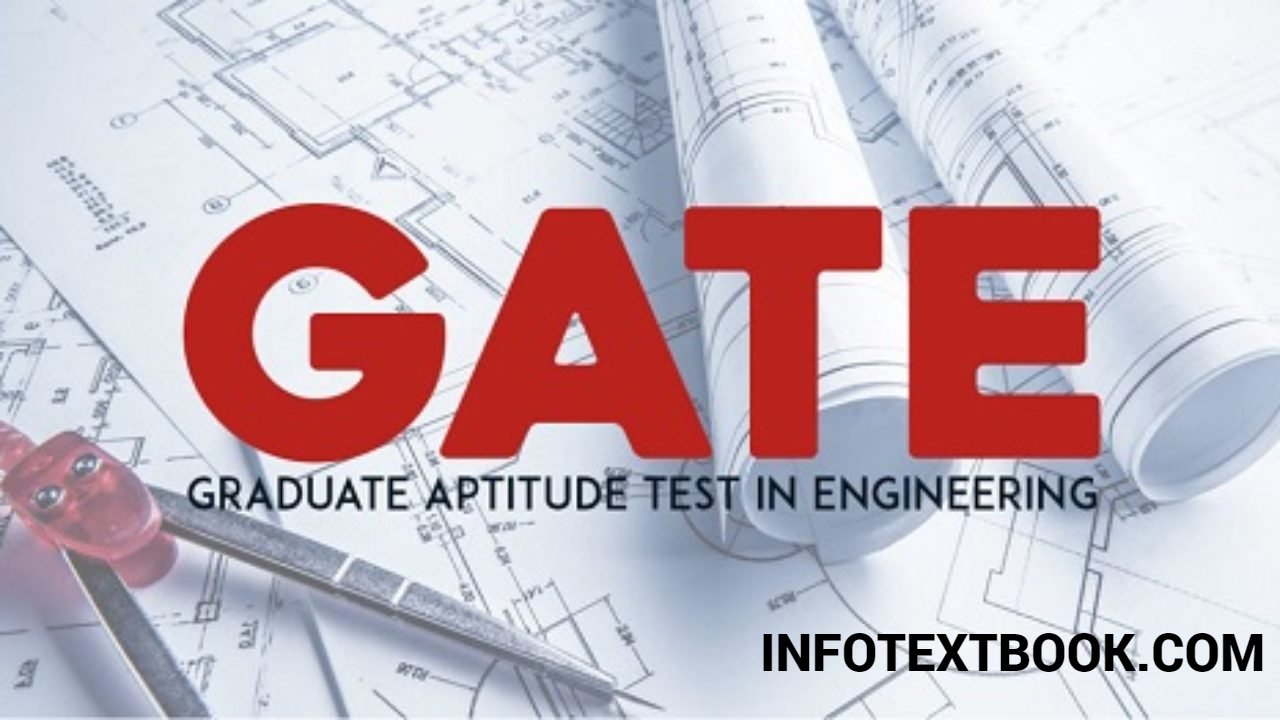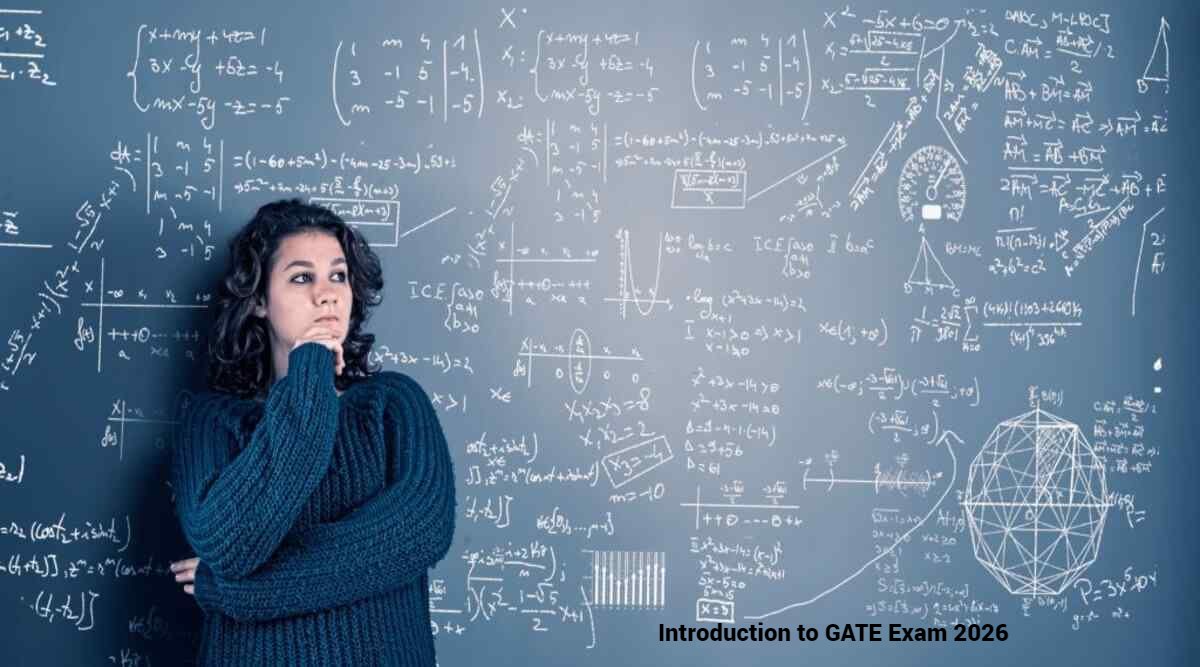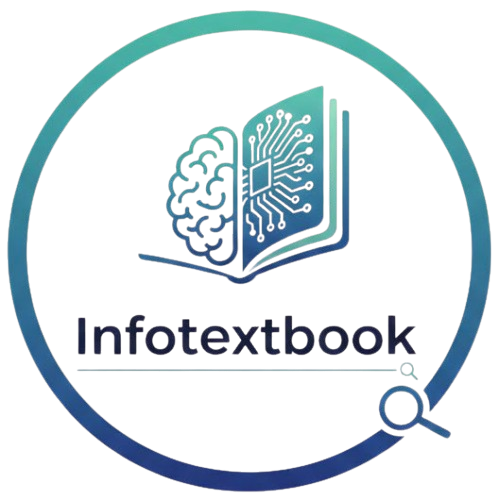Table of Contents
ToggleCrack GATE Exam 2026 Syllabus, Cutoff, Eligibility & Success Tips

Introduction to GATE Exam 2026
The GATE Exam (Graduate Aptitude Test in Engineering) is one of the most prestigious national-level entrance tests in India. Conducted jointly by the IITs and IISc, it evaluates candidates on their knowledge of engineering, science, and technology subjects. GATE scores are widely used for M.Tech admissions, PSU recruitments, and fellowships, making it an essential milestone for engineering graduates.
Eligibility Criteria for GATE Exam
To apply for GATE Exam 2026, candidates must:
Hold a Bachelor’s degree in Engineering, Technology, or Architecture.
OR hold a Master’s degree in Science/Mathematics/Arts/Commerce.
Final-year students are also eligible.
No upper age limit is prescribed, making it open for all graduates.
GATE Exam 2026 Syllabus Overview
The syllabus of GATE varies by subject, but it mainly covers:
Engineering Mathematics (common for most papers)
Core Subject Knowledge (Mechanical, Civil, Electrical, Computer Science, etc.)
General Aptitude (15% of total marks)
With more than 30 disciplines available, candidates should carefully select the paper that aligns with their academic background and career goals.
Exam Pattern & Marking Scheme
Mode: Computer-Based Test (CBT)
Duration: 3 hours
Question Types: Multiple Choice Questions (MCQs), Multiple Select Questions (MSQs), and Numerical Answer Type (NAT)
Total Marks: 100
Negative Marking: Applicable for MCQs
GATE Exam Cutoff 2026 (Expected)
The cutoff for GATE Exam 2026 will depend on the difficulty level of the paper, number of candidates, and category. Based on past trends:
General Category: 25–30 marks
OBC/EWS Category: 22–27 marks
SC/ST/PwD: 16–20 marks
These are approximate cutoffs and will vary by subject.
Preparation Strategies for Success
To crack the GATE Exam 2026, candidates should:
Understand the syllabus & exam pattern thoroughly
Practice previous years’ papers to identify trends
Focus on conceptual clarity rather than rote learning
Take mock tests regularly to improve speed and accuracy
Use standard reference books and online study resources
Manage time effectively with a daily study plan
Career Opportunities After GATE
Qualifying the GATE Exam opens multiple opportunities, including:
M.Tech/M.E admissions in top IITs, NITs, and IIITs
PSU jobs in companies like BHEL, NTPC, IOCL, and ONGC
Research & Fellowships in top institutions
International opportunities in select universities abroad
Introduction to GATE Exam 2026

Introduction to GATE Exam 2026
The GATE Exam (Graduate Aptitude Test in Engineering) is one of the most competitive and prestigious entrance examinations in India, primarily designed to assess the knowledge and understanding of undergraduate-level subjects in engineering, technology, architecture, and science. Jointly conducted by the Indian Institute of Science (IISc) Bangalore and the Indian Institutes of Technology (IITs) on a rotational basis, this national-level examination has gained immense importance for students aspiring to pursue higher education and professional careers in India and abroad.
The GATE Exam 2026 will serve as a gateway for students who aim to secure admission into postgraduate programs such as M.Tech, M.E, or Ph.D. in leading institutions like the IITs, NITs, and IIITs. Many foreign universities in countries such as Germany, Singapore, and the UK also accept GATE scores, making it a globally recognized examination. Beyond academic opportunities, a good GATE score also opens doors to career paths in Public Sector Undertakings (PSUs) like BHEL, NTPC, ONGC, and IOCL, where recruitment is often based on GATE scores.
Another crucial reason why students aim to crack the GATE Exam 2026 is its versatility. Unlike many other competitive exams, it does not impose an upper age limit, enabling even working professionals to take the exam and enhance their career prospects. The examination is conducted online in the Computer-Based Test (CBT) mode, consisting of multiple-choice questions, numerical answer-type questions, and multiple-select questions. With more than 30 subject papers to choose from, candidates can select the discipline that matches their academic background and career aspirations.
In recent years, the popularity of GATE has increased significantly due to its role in securing scholarships, stipends, and research opportunities funded by the Ministry of Education and other organizations. The exam not only evaluates technical knowledge but also tests problem-solving ability, logical reasoning, and aptitude, ensuring that only the most skilled and determined candidates succeed.
For students planning ahead, starting early preparation with a structured study plan, consistent practice, and time management can make all the difference in achieving success in the GATE Exam 2026. By focusing on both conceptual clarity and exam strategy, aspirants can turn this challenging exam into a rewarding stepping stone toward their career goals
Eligibility Criteria for GATE Exam

Eligibility Criteria for GATE Exam 2026
The GATE Exam (Graduate Aptitude Test in Engineering) is one of the most important exams for students aiming to pursue higher education in engineering, science, or technology, as well as for those looking to secure positions in Public Sector Undertakings (PSUs). To ensure fairness and inclusivity, the eligibility criteria are clearly defined by the exam authorities. Candidates planning to appear for the GATE Exam 2026 should carefully review these conditions before applying.
1. Educational Qualification
Bachelor’s Degree Holders: Students who have completed or are in the final year of their B.E., B.Tech, B.Arch, or B.Pharm are eligible.
Master’s Degree Holders: Candidates with a degree in M.Sc., M.A., MCA, or equivalent are also allowed.
Integrated Programs: Students enrolled in integrated programs like B.Sc.–M.Sc. or B.Tech–M.Tech can apply, provided they are in the final year or have already completed the degree.
2. Year of Passing
There is no restriction on the year of graduation. Even if a candidate completed their degree several years ago, they remain eligible to sit for the exam, provided their qualifications meet the criteria. This makes the GATE Exam one of the most flexible competitive exams in terms of eligibility.
3. Age Limit
Unlike many other national level entrance tests, the GATE Exam has no upper age limit. Candidates can attempt the exam at any stage of their academic or professional journey, which provides equal opportunity for fresh graduates as well as working professionals seeking career advancement.
4. International Students
The exam also allows students from Bangladesh, Nepal, Sri Lanka, Ethiopia, and the United Arab Emirates (UAE) to appear. They must hold or be in the final year of a bachelor’s degree in engineering or a master’s degree in a relevant field.
5. Number of Attempts
There is no limit on the number of attempts for the GATE Exam. Aspirants can apply as many times as they wish, enabling them to improve scores over multiple years
GATE Exam 2026 Syllabus Overview

GATE Exam 2026 Syllabus Overview
The GATE Exam 2026 syllabus is designed to test candidates’ comprehensive understanding of undergraduate-level engineering and science subjects. It is vast but well-structured, enabling aspirants to focus on core areas relevant to their discipline while also strengthening general aptitude and problem-solving skills. With over 30 disciplines available, candidates must carefully choose their paper according to their academic background and career aspirations.
General Aptitude (15% Weightage)
This section is common across all subjects and evaluates logical reasoning, numerical ability, and verbal skills. It usually carries 15 marks and is crucial for boosting overall performance. Topics include:
Verbal ability: English grammar, sentence completion, synonyms, antonyms, reading comprehension
Numerical ability: Algebra, probability, percentages, ratios, averages, data interpretation
Engineering Mathematics (10–13% Weightage)
Engineering Mathematics is included in most technical papers and contributes significantly to scoring. Major topics are:
Linear Algebra
Calculus and Differential Equations
Probability and Statistics
Complex Variables
Numerical Methods
Subject-Specific Core Topics (70–72% Weightage)
The majority of the syllabus depends on the paper chosen by the candidate. For example:
Computer Science (CSE): Programming, Algorithms, Data Structures, Theory of Computation, Databases, Operating Systems, Computer Networks
Mechanical Engineering (ME): Thermodynamics, Fluid Mechanics, Strength of Materials, Theory of Machines, Manufacturing, Heat Transfer
Civil Engineering (CE): Structural Analysis, Geotechnical Engineering, Environmental Engineering, Transportation, Hydrology, Concrete Technology
Electrical Engineering (EE): Electric Circuits, Signals and Systems, Power Systems, Machines, Control Systems, Power Electronics
Electronics (ECE): Analog and Digital Circuits, Communications, Electromagnetics, Microprocessors
Each discipline has a detailed syllabus released by the organizing IIT. Aspirants are advised to download the official GATE syllabus PDF for clarity.
Importance of Understanding the Syllabus
Knowing the GATE Exam syllabus thoroughly is the first step toward an effective preparation strategy. It helps candidates identify high-weightage subjects, allocate study time efficiently, and avoid wasting energy on irrelevant topics. With systematic preparation, conceptual clarity, and consistent practice, mastering the GATE Exam 2026 syllabus becomes achievable
Exam Pattern & Marking Scheme

Exam Pattern & Marking Scheme for GATE Exam 2026
The GATE Exam follows a well-structured Computer-Based Test (CBT) format designed to evaluate both subject knowledge and problem-solving skills of candidates. Understanding the exam pattern and marking scheme is crucial for effective preparation, as it helps students prioritize topics, manage time efficiently, and avoid unnecessary mistakes in the actual exam.
Mode and Duration
The GATE Exam is conducted online in a CBT mode across multiple sessions. The total duration is 3 hours (180 minutes), during which candidates must attempt all the questions in one sitting. Once the exam starts, no additional time is provided, making time management extremely important.
Question Types
The paper consists of three types of questions:
Multiple Choice Questions (MCQs): Each MCQ has four options, and candidates must select the correct one. Wrong answers in MCQs attract negative marking.
Multiple Select Questions (MSQs): Similar to MCQs but may have more than one correct answer. Candidates must choose all correct options to get marks. There is no negative marking for MSQs.
Numerical Answer Type (NAT): Questions where candidates must enter the numerical value directly. No options are provided. Like MSQs, there is no negative marking for NAT questions.
Total Marks and Sections
The exam carries 100 marks in total.
Questions are distributed across:
General Aptitude (GA): 15 marks
Engineering Mathematics (for selected papers): 13–15 marks
Core Subject Knowledge: 70–72 marks
This structure ensures a balanced assessment of analytical ability, general aptitude, and technical expertise.
Marking Scheme
1-mark questions: Wrong answers lead to a deduction of 0.33 marks.
2-mark questions: Wrong answers lead to a deduction of 0.66 marks.
No negative marking applies to MSQs or NAT questions.
Key Takeaways
Focus on accuracy to avoid negative marking in MCQs.
Maximize scoring potential in MSQs and NAT questions since there is no penalty.
Allocate sufficient time for General Aptitude, as it offers easy scoring opportunities.
In summary, a clear understanding of the GATE Exam pattern and marking scheme can make preparation more strategic. By practicing under timed conditions and balancing accuracy with speed, candidates can optimize their performance and significantly improve their chances of success
GATE Exam Cutoff 2026 (Expected)

GATE Exam Cutoff 2026 (Expected)
The GATE Exam is a highly competitive national-level test, and every year, lakhs of students appear to secure admission in IITs, NITs, and prestigious PSUs. One of the most important aspects of this exam is the cutoff marks, as they decide whether a candidate qualifies for further admission rounds or job opportunities. The GATE Exam cutoff 2026 is expected to vary across subjects, categories, and institutes, making it crucial for aspirants to analyze past trends to set realistic preparation goals.
Factors Affecting GATE Cutoff 2026
Several factors play a role in determining the cutoff marks:
Difficulty Level of the Exam: A tougher paper usually leads to lower cutoff marks, while an easier one pushes the cutoff higher.
Number of Applicants: With increasing registrations each year, competition becomes stiffer, often raising the cutoff.
Total Number of Seats Available: Limited seats in IITs and NITs directly influence cutoff levels.
Category of the Candidate: Cutoffs differ for General, OBC, SC/ST, and PwD candidates.
Expected GATE Exam Cutoff 2026 by Category
Based on previous years’ data, here are the expected cutoffs for some of the popular streams:
General Category: 25–30 marks
OBC/EWS: 22–27 marks
SC/ST/PwD: 16–20 marks
For highly competitive papers like Computer Science, Electronics, and Mechanical Engineering, the cutoff might go on the higher side, whereas for less popular branches, it could be lower.
Importance of Cutoff in Career Planning
Understanding the expected cutoff helps aspirants:
Set target scores while preparing for the exam.
Choose the right strategy for revision and mock tests.
Shortlist institutes based on achievable ranks.
Decide on alternative career options if the desired score is not achieved
Preparation Strategies for Success

Preparation Strategies for Success (400 Words)
Preparing for the GATE Exam requires not only academic knowledge but also a smart approach that balances time management, consistent practice, and conceptual clarity. Every year, lakhs of candidates appear for this highly competitive test, but only a fraction succeed. To stand out, you need a clear plan that aligns with your strengths and addresses your weaknesses.
The first step is to analyze the syllabus thoroughly. The GATE syllabus may look vast, but it follows a structured pattern. Break it down into smaller topics and create a timetable that covers both core subjects and general aptitude. This ensures that you dedicate enough time to each area without feeling overwhelmed.
Conceptual clarity is more important than memorization. Focus on understanding the logic behind formulas, theories, and principles. Use standard textbooks and reference materials instead of relying only on shortcuts. Once concepts are strong, practice applying them in problem-solving, which is the key to scoring well in the exam.
Previous years’ papers are a goldmine for preparation. They not only give you an idea of the question format but also highlight frequently asked topics. Solving these papers under exam-like conditions helps you gauge your speed, accuracy, and problem-solving approach.
In addition, mock tests play a crucial role. Schedule weekly or bi-weekly mock exams to simulate the real test environment. Analyze your performance after each test—identify weak areas and focus on improving them. This cycle of practice and analysis builds confidence and reduces exam-day stress.
Time management is another important skill. While preparing, allocate study hours wisely—dedicate more time to subjects that carry higher weightage. On exam day, learn to prioritize questions. Start with the ones you are confident about, and return to tougher ones later to avoid wasting time.
Consistency is the backbone of success. Even short, daily study sessions are more effective than long, irregular ones. Combine study with healthy habits—adequate sleep, regular breaks, and a balanced diet—to maintain focus and stamina.
Finally, stay positive and motivated. Many aspirants give up midway due to stress or pressure, but perseverance makes the difference. With discipline, smart strategy, and regular practice, cracking the GATE Exam becomes a realistic and achievable goal
Career Opportunities After GATE

Career Opportunities After GATE
Qualifying in the GATE Exam opens up a wide range of career opportunities for engineering and science graduates. It is not just an entrance test for higher studies but also a recognized benchmark for technical excellence. Candidates who perform well can pursue academic, professional, and research pathways in India and abroad.
1. Higher Education in Top Institutions
One of the most common opportunities after clearing GATE is admission into M.Tech/M.E programs in prestigious institutions like the IITs, NITs, and IIITs. These programs provide advanced technical knowledge, hands-on research exposure, and specialization in core engineering fields. Students also benefit from scholarships and stipends provided by the Ministry of Education. A postgraduate degree further enhances career growth, opening doors to teaching, research, and leadership roles in industries.
2. PSU (Public Sector Undertaking) Jobs
Many PSUs such as ONGC, NTPC, IOCL, BHEL, and GAIL recruit engineers directly through GATE scores. These jobs are highly desirable for their stability, good salary packages, and additional perks such as healthcare, housing, and pension benefits. Working in a PSU also gives candidates the opportunity to contribute to the nation’s infrastructure and technological growth.
3. Research & Fellowships
The GATE Exam also acts as a gateway for research fellowships in organizations like CSIR, DRDO, BARC, and ISRO. Research scholars can contribute to innovation in areas such as space, nuclear technology, renewable energy, and advanced engineering solutions. Many research fellowships come with financial support, making it easier for students to pursue higher education and innovation-driven careers.
4. Global Opportunities
Interestingly, GATE scores are accepted by certain universities abroad, especially in Singapore and Germany, for postgraduate admissions. This opens the door for international exposure, access to advanced laboratories, and collaboration with global experts in technology and engineering.
5. Teaching & Academia
For those interested in academics, a postgraduate degree through GATE can lead to teaching roles in universities, engineering colleges, and polytechnic institutions. This path allows individuals to shape future engineers while conducting research in their areas of interest.
Final Thoughts

Final Thoughts
The GATE Exam 2026 is more than just an entrance test—it is a life-changing opportunity for engineering and science graduates aiming to pursue higher studies or secure jobs in prestigious Public Sector Undertakings (PSUs). What makes this exam unique is its ability to open diverse pathways, from M.Tech admissions in IITs and NITs to research opportunities and even international prospects.
Preparing for the GATE Exam requires not only technical knowledge but also dedication, time management, and consistent practice. Candidates must focus on building strong fundamentals, solving previous years’ question papers, and taking regular mock tests to identify strengths and weaknesses. With a smart strategy and disciplined study plan, cracking GATE becomes much more achievable.
Another key point is that the GATE score remains valid for three years, which means aspirants have flexibility in planning their academic or professional journey. Moreover, qualifying in GATE enhances employability, as many PSUs directly recruit based on scores.
FAQs on GATE Exam 2026
Q1. What is the GATE Exam?
The GATE Exam (Graduate Aptitude Test in Engineering) is a national-level entrance test for admissions to postgraduate programs and recruitment in Public Sector Undertakings (PSUs).
Q2. Who conducts the GATE Exam 2026?
The exam is conducted jointly by the Indian Institute of Science (IISc) and seven Indian Institutes of Technology (IITs) on a rotational basis.
Q3. What is the eligibility for GATE Exam 2026?
Candidates with a Bachelor’s degree in Engineering/Technology/Architecture or a Master’s degree in Science/Commerce/Arts are eligible. Final-year students can also apply.
Q4. Is there any age limit for GATE Exam?
No, there is no age restriction. Anyone meeting the educational qualifications can appear.
Q5. How many papers can I choose in GATE 2026?
Candidates can appear for up to two papers, provided the chosen combination is allowed by the organizing authority.
Q6. What is the validity of the GATE score?
The GATE score is valid for three years from the date of result announcement.
Q7. What is the exam pattern of GATE 2026?
The exam consists of MCQs, MSQs, and NAT questions for 100 marks, with a duration of 3 hours.
Q8. What is the expected cutoff for GATE Exam 2026?
Cutoffs vary by subject and category, but generally range between 25–30 marks for General candidates.
Q9. Can I get a PSU job through GATE?
Yes, many PSUs like NTPC, IOCL, ONGC, and BHEL recruit directly based on GATE scores.
Q10. How should I start preparing for GATE Exam 2026?
Start with understanding the syllabus, follow standard textbooks, solve past year papers, and take mock tests to track progress.






